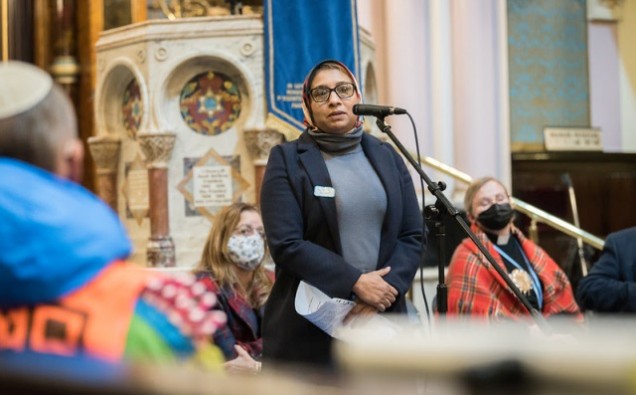COP26 is underway, and as the conference officially opened, the Lutheran World Federation (LWF) joined Islamic Relief Worldwide and religious leaders from a range of faiths and traditions gathered in Glasgow to express shared, urgent calls for climate justice.
Convening at Garnethill Synagogue on Sunday, religious leaders from no less than 10 different religions gathered for an interfaith service and Talanoa dialogue session to share experiences and discern ways forward as faith communities look to support the continued efforts for mitigation of the global climate crisis.
More than 200 people attended the event – either onsite and online – which was intentionally modelled as an effort to ensure voices from all over the globe, and not just those able to physically be in Glasgow, can be heard.
Through the Talanoa methodology, the event provided space for discerning key advocacy messages for the two weeks ahead, as various religious groups will seek to push climate negotiators for action.
Deep justice issues are at play as the world grapples with the impact of the climate crisis, as the poorest and most marginalized people around the world continue to bear the brunt of the effects of climate change, while they are at the same time the ones least responsible for causing that same crisis.
At the same time, with the recent release of major data assembled by the IPCC ahead of the climate negotiations in Glasgow, the world is currently on what UN secretary-general Antonio Guterres has described as ‘a catastrophic path’ of global warming not projected to stay near the Paris accord’s target of keeping global warming to less than 1.5 degrees Celsius above pre-industrial levels.
The science is clear: to stand a chance at achieving the 1.5-degree target, the world needs to halve emissions over the next decade and reach net-zero carbon emissions by the middle of the century. Even at a 1.5-degree increase, global warming will have severe effects on ecosystems, human health and well-being across the board, but if urgent action is not taken, it is projected that the world will instead be facing an increase in temperature of as much as 3.2 degrees, with disastrous consequences to follow.
So the importance of mobilizing people across all faiths and no faith, across all sectors of civil society to push governments to take action urgently can hardly be overestimated.
COP26 is understood as the most important COP meeting in a long time. It takes place after the conclusion of the first five-year cycle outlined in the Paris accord from 2015, meaning it is the first time nations submit progress reports on the so-called nationally determined contributions (NDCs) they have committed to, and more importantly to up ambitions for the next cycle ahead.
Nora Antonsen from the Church of Norway is one of 32 youth delegates representing the LWF at COP26. She observed the power in standing united across multiple faiths in addressing climate change, and speaking up for climate justice.
“When I see that people of different faiths – who often in media are portrayed as people who do not understand each other well because of their religious differences – stand together like this it gives me a new hope for the world,” Antonsen reflected.
“We all care for our brothers and sisters, and climate justice is a really big part of that. And that gives me hope and motivation for the future, that actually people of faith can be a motor and accelerator in the work we do for climate justice both at international, national and local levels,” she stated.
For Rev. Mari Valjakka and indigenous Sami pastor from the Evangelical Lutheran Church of Finland – an LWF member church – spoke about relations to the native lands of the indigenous peoples around the world, and how this relationship is crucial to the way we take action on the climate.
“Our homeland is not wasteland waiting to be exploited,” she said. As indigenous peoples we believe we have the wisdom of how to live at peace with our planet. Please, let us share this wisdom,” she urged.
Shahin Ashraf, head of global advocacy for Islamic Relief Worldwide, continued to stress the urgency of the current situation. “The challenges we face will be many, but I tell you brothers and sisters, the opportunities will be equally as many,” she reflected.
On the question of what we want from COP, the answer is we want the money, we want the plan, we want the economy, we want distribution and we want justice, she said.
And the voices of faith communities have been expressed clearly in Glasgow from the outset.
Earlier on the Sunday, an interfaith vigil convened hundreds of religious leaders at George Square in central Glasgow, where a joint statement was shared urging governments to put the Paris agreement into action, and join in ‘collective prayer with all those who are working for a successful COP26.’
Bishop Mark Strange from the Episcopal Church in Scotland, who joined both the vigil and the interfaith panel at Garnethill reflected: “We are all here to be activists and to push the point, but this all also affects us. I want you all to reflect on how this all affects you. It does matter, what you do.”
Photo by LWF/Albin Hillert














